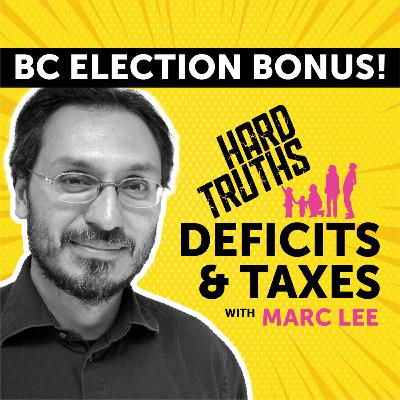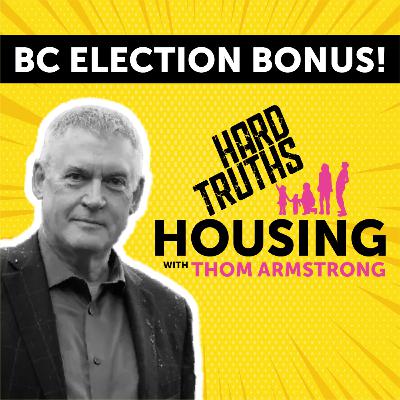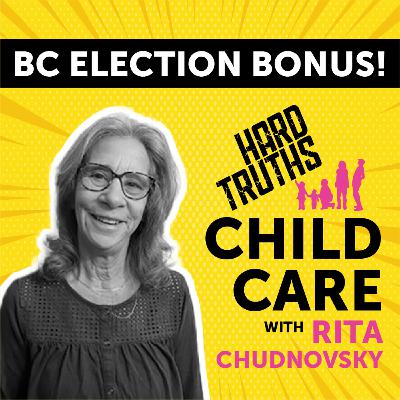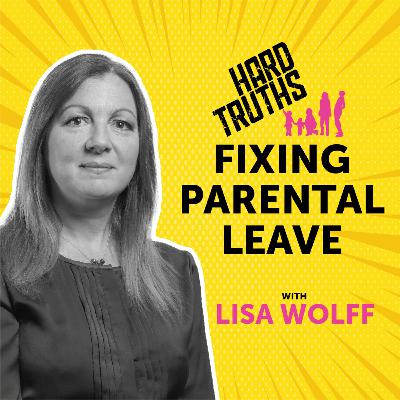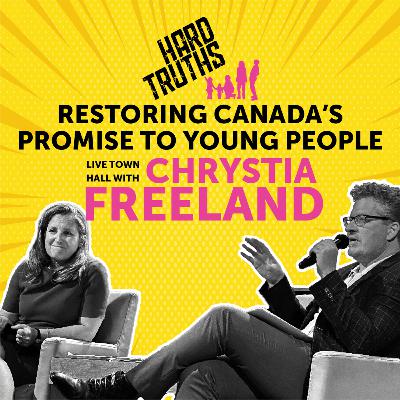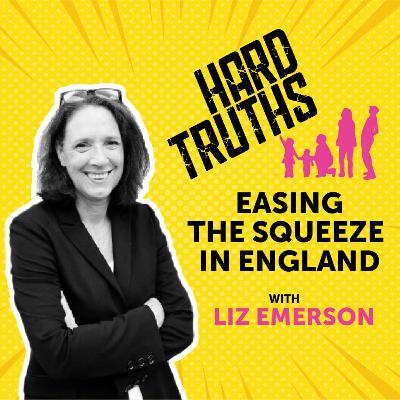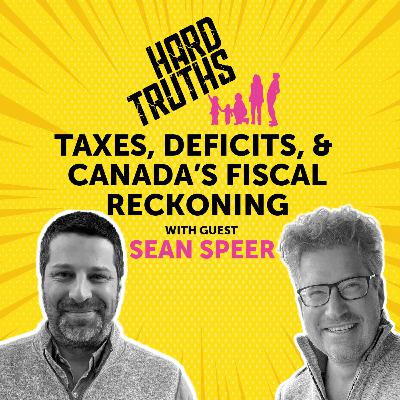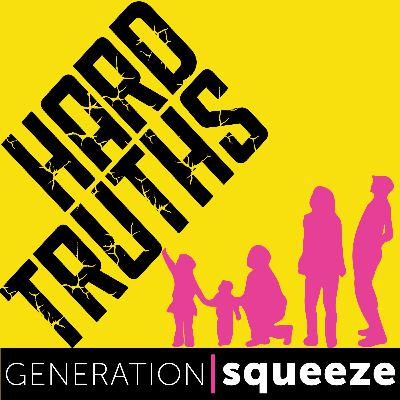Discover Generation Squeeze's Hard Truths
Generation Squeeze's Hard Truths

Generation Squeeze's Hard Truths
Author: Generation Squeeze
Subscribed: 32Played: 570Subscribe
Share
© 363771
Description
Gen Squeeze's Hard Truths brings you the untold story about why basic life milestones – like owning a home, raising a family, and living on a habitable planet – are slipping out of reach for younger Canadians and explores how we can make this country work more fairly for all generations. Learn more at https://www.gensqueeze.ca/
70 Episodes
Reverse
For our last election bonus, we dip into the sexiest of ballot issues: deficits and taxes. Our guest is Marc Lee, senior economist with the Canadian Centre for Policy Alternatives in BC. Deficits and medical budgets are ballooning across Canada, as there are fewer workers to support more and more retiring baby boomers. How do BC parties propose to balance spending and revenue, while meeting the needs of both young and old British Columbians? To learn more, check out our BC Voters Guide! Please note that we recorded this interview shortly before the Conservative Party of BC released its costed platform, so the Voters Guide has our most up-to-date analysis and report card on deficits.
As election day approaches, housing affordability and access are top of mind for many British Columbians. The BC NDP, Green, and Conservative parties acknowledge the severity of the crisis, but they offer very different plans to tackle it. We spoke about those differences with Thom Armstrong, CEO of BC’s Cooperative Housing Federation. We also dig into a few of the key strengths and weaknesses in housing platforms that matter most for younger and future generations.
Dig deeper
Our BC Election Housing Report Card
Housing Central’s BC Election Platform Analysis
Our full BC Voters Guide
We dig into what the BC NDP, Conservatives and Green parties are promising on child care. Our guest Rita Chudnovsky serves on the board of the Coalition of Child Care Advocates of BC and has spent three decades advocating for child care with organizations across Canada. The conversation should interest all Canadians concerned about supporting families with affordable child care.
Learn more:
Our Good Ancestor Report Card on Child Care
$10aDay's BC Election Platform Analysis from the Coalition of Child Care Advocates of BC and the Early Childhood Educators of BC
Generation Squeeze's non-partisan BC Voters Guide with our election analyses on child care, housing, deficits, climate, and health.
Canada's outdated, underfunded parental leave system is failing too many families. UNICEF's Lisa Wolff explains why one in three infants is falling through the cracks in this system, and how we can give all children a good start in life, by giving their parents adequate time off and income to care for them.
Dig Deeper
UNICEF Canada's parental leave campaign
Generation Squeeze's family policy solutions
"Helping our kids thrive is a shared responsibility" by Andrea Long, Gen Squeeze Senior Director of Research & Knowledge Mobilization
Deputy Prime Minister and Finance Minister Chrystia Freeland spoke with Gen Squeeze founder Paul Kershaw and our supporters about the federal government's plans to deliver on its budget's promise to restore "Fairness for Every Generation," through investments in housing, child care, climate action, and economic growth. They also tackle the imbalance in spending on older and younger Canadians. This is a recording of a live town hall in Vancouver on June 20.
Dig Deeper
Event slides with budget infographic and more
Support our call for an Act to Safeguard the Wellbeing of Present and Future Canadians
Our take on Budget 2024
Previous Hard Truths episodes with Prime Minister Trudeau, NDP Leader Jagmeet Singh, and Green Party Leader Elizabeth May
Prime Minister Justin Trudeau sat down with Gen Squeeze Founder Paul Kershaw for a live show with our supporters and allies in Vancouver. They delved into the 2024 Budget's focus on "Fairness for Every Generation," as well as housing, child care, climate change, deficits, and the challenge of protecting healthy retirements without sacrificing the wellbeing of younger and future Canadians.
Dig Deeper
Slides from the event with graphics
Prime Minister Trudeau's budget announcement video, which ends with a plea to older generations: "We can't let them down."
Support our call for an Act to Safeguard the Wellbeing of Present and Future Canadians
Our take on Budget 2024
Leger x Post Media report that found most Gen Z & Millennials agree that politicians are more interested in protecting interests of older generations and that previous generations are ‘rigging the system’.
Previous Hard Truths episodes with NDP Leader Jagmeet Singh and Green Party Leader Elizabeth May
Younger Canadians are far from alone in feeling squeezed by the rising costs of housing, child care, and higher education. In this episode, we spoke with Liz Emerson, CEO of the UK's Intergenerational Foundation, about the symptoms of generational unfairness harming young people in England, as well as the progress her organization has made calling political attention to their plight and fighting for a fairer deal for young and future generations.
Have a minute to help us? Please take our quick survey to help us improve how we keep in touch with our supporters.
Dig Deeper
"Canada promises generational fairness" by Liz Emerson
Hard Truths: Younger Australians aren't getting "a fair go" either
When you think about what makes us healthy, do you think of doctors, medicine, and hospitals? Or do you think of affordable housing, living wages, and quality child care? Our health depends much more on the conditions in which we are born, grow, live, work and age than on the medical care we receive. But for decades Canadian governments have devoted more and more of their budgets to medical care, leaving less money for the social supports that matter more to lifelong wellbeing. This unhealthy imbalance in government spending is a major obstacle in our quest to make Canada work more fairly for all generations. So we spoke with award-winning author and journalist André Picard about how curing our “sickness care system” will require greater investment in the building blocks of a healthy society.
André Picard has been writing about health for The Globe & Mail since 1987 and was appointed to the Order of Canada last year for his dedication to public health journalism.
Dig Deeper
Get Well Canada, our alliance pushing Canadian governments to rebalance how they invest in wellbeing
"Canada must rethink health spending strategy" by André Picard, The Globe & Mail
"Smart health-care policy must include affordable housing" by André Picard, The Globe & Mail
CBC Ideas: "We don't have a health-care crisis, it's an implementation crisis, says André Picard"
CCPA's The Monitor featuring Get Well Canada
Watch our video about Past Policy Chickens
Governments of all party stripes, across Canada, must confront a gnarly problem when it comes to investing more fairly in all ages. How do we pay for the ballooning retirement costs of baby boomers, without skimping on the needs of younger people and burdening future generations with massive public debts? And more basically, how can we have "adult conversations" about how to pay for the Canada we want? Gen Squeeze founder Paul Kershaw delves into these questions and more with leading conservative thinker Sean Speer.
Sean is editor-at-large at The Hub, a Public Policy Forum fellow, and an assistant professor at the University of Toronto's Munk School of Global Affairs and Public Policy. He was previously a senior economic adviser to former Prime Minister Stephen Harper.
Dig deeper:
Our Budget Season 2024 commentary and Substack Chat, where you can share your budget questions and ideas during our “Office Hours” on April 19.
“A fiscal reckoning is coming for Canada” by Sean Speer, The Hub
“Protect OAS by eliminating outdated tax shelters for retirees” by Paul Kershaw, The Globe & Mail
“Globe & Mail: Canada’s promise to NATO collides with spending increases for retirees” by Paul Kershaw, The Globe & Mail
Paul Kershaw’s provincial budget commentary in The Hub:
Ontario's budget further burdens younger Ontarians
Alberta's Conservatives double down on expensive health care strategy
The B.C. budget highlights just how expensive the Boomers' retirements will be
We spoke with journalist Michelle Cyca about one of the hardest truths we grapple with (and which gets us a lot of hate mail). Skyrocketing home prices have made many older Canadian homeowners rich, while making housing unaffordable for younger generations. But many homeowners resist thinking of themselves as wealthy, especially whenever the subject of fair taxation comes up. So how do we get more homeowners to recognize their wealth and put it to work fixing our housing crisis?
We also discuss the high, personal stakes of housing unaffordability; how it’s changing Canadian neighborhoods and society; why "just move somewhere affordable" isn't a solution; and street parking.
Michelle Cyca is the editor of Indigenous-led conservation coverage for The Narwhal and a regular contributor to The Walrus, Maclean’s, and many other publications.
Dig deeper:
The End of Homeownership by Michelle Cyca in Maclean's
Homeowners Refuse to Accept the Awkward Truth: They’re Rich by Michelle Cyca in The Walrus
Attention older, affluent homeowners: Let’s put our housing wealth to work by Paul Kershaw in The Globe & Mail
Is a bedroom for the cat a sign of Canada's new housing aristocracy? by Paul Kershaw in The Globe & Mail
David Coletto has had his finger on the pulse of Canadian public opinion for well over a decade, as the founder and CEO of Abacus Data and author of the inFocus newsletter. He shares insights into how generational inequality is playing out in our housing, affordability and climate crises. He warns that not closing this gap could have grim consequences for Canada's economy and social fabric. Yet he's still optimistic we can turn things around.
Articles & reports discussed
A Zero-Sum Mindset and Canadian Politics & Business
Housing Affordability Hits Home: A closer look at Canadian families’ financial stress
How the Housing Crisis Is Impacting the Goals and Well-Being of Younger Canadians
Opinions on Housing and Climate: Do Canadians Want a Climate-Centred Fix to Housing?
Understanding Canadian Perceptions of the Climate Action Incentive Payment and the Carbon Tax: An In-Depth Poll Analysis
Highlights
"The largest predictor of inequality among those 30 to 40 is whether they own their home or not. And [if that continues] that's going to make this country far more vulnerable to the kinds of shocks that none of us want to see. And housing will be the thing that creates that rise of extremism that is right now starting to occur."
"If there's any country in the world that can figure this out -- that has enough wealth, enough opportunity, that knows how to bring different people together and live together -- it's Canada. And so positive-sum thinking is basically saying, we can lift all boats. Everybody can have a home. Maybe not be able to own, but everybody should be able to have shelter and live the life that they want. And let's figure out the public policy choices that get us there."
Millennial Mayor Natasha Salonen of Wilmot, Ontario, made national news last summer: she can't afford to live in the small, rural town she leads. Besides showcasing how younger Canadians are being priced out of their hometowns, Mayor Salonen also reminded us of the power of speaking out. By sharing her story, she's reassured many younger people that they're not alone, and she's helped many older homeowners understand how the housing crisis is harming younger generations and their communities.
"Every idea – and even every rule that governs us now – came out of an idea that somebody had in an initial conversation," she said. "I think one of the biggest powers that people have as individuals is the ability to have conversations."
Feeling inspired to share your story? We want to hear how generational unfairness touches your life and the lives of those you love: gensqueeze.ca/share_story
Better balancing our time at work and our time at home has long been a centrepiece of our family policy solutions. So in this episode, Paul and Megan spoke with Joe O'Connor, a leader in the work-time reduction movement.
Joe O'Connor directs the Work Time Reduction Center of Excellence in Toronto. Previously Joe was CEO of 4 Day Week Global where he led many successful work-week reduction projects around the world.
Highlights
"Lots of modern roles have been really completely overwhelmed with this fluff when it comes to overlong and unnecessary meetings, distraction and interruption in the work day, poor use of technology, outdated processes. And once you actually put in place a framework and an incentive structure… you find that actually getting five days worth of outcomes in four days at work is often much less of an impossible dream than you might have first believed," says Joe.
"If you can actually free up time -- not just for people to be able to do the things that really matter of outside of work, but actually to be able to hone in on the things that they know drive value, that they know are making a real contribution to their organization’s objectives while they're at work -- that's a double dividend. That's something that can boost people's life satisfaction in two ways."
Dig deeper
Work Time Reduction Center of Excellence
The Globe & Mail: Can I trade a higher retirement age for a four-day workweek?
Policy changes for work-life balance
Our policy solutions to support young families
4 Day Week Global
Canada isn't the only nation squeezed by the symptoms of generational unfairness, and Gen Squeeze isn't the only organization squeezing back. To kick off our "We're not alone" miniseries, Paul Kershaw and Angie Chan spoke with Tom Walker, lead economist at Think Forward in Australia.
Down under, Tom explains that younger generations are "doing it tough" too, faced with unaffordable housing, rising living and education costs, precarious jobs with declining wages, extreme weather -- all set against an ominous backdrop of one global crisis after another. Tom tells us how his organization is pushing for a parliamentary inquiry and a more fair tax system to invest in the collective wellbeing of young and old alike.
"There’s something that sits above all this: that persistent short-termism in our government outlook and the policy they make, and their lack of ability or courage to do meaningful reform to address any of these things," Tom says. "And an economic system which supports [older] people who are already wealthy... if you dump all your money into property, you pay less tax than someone who's working."
Think Forward is the first voice we'll be bringing you from our international coalition of generational fairness champions, which launched the inaugural worldwide Intergenerational Fairness Day last month. Stay tuned for more!
Learn more:
Think Forward
Our recap of Intergenerational Fairness Day
Intergenerational Fairness Day coalition podcast
A lot of Canada's current crises were caused in part by past governments failing to think beyond election cycles. So how can we make governments think more long term and consider the impact of their decisions on future generations? To find out, we spoke with Jerry DeMarco, the Commissioner of the Environment and Sustainable Development in Canada’s Office of the Auditor General.
Our conversation touched on:
How his office holds the federal government to account on its sustainable development promises
How Canada went from leader to laggard on climate action
Comparing sustainable development and generational fairness
How Canada and other countries can embed long-term thinking in government decisions
Commissioner DeMarco has been interested in intergenerational equity for much of his 25-year career as a leading expert on environmental law. Before joining the OAG, he served as Commissioner of the Environment and Assistant Auditor General at the Office of the Auditor General of Ontario.
PS: If you're interested in past policy decisions harming younger generations today, mark your calendars for Generation Squeeze's first Community Call on November 16! Register here.
Interview Highlights
“It’s kind of ironic that the institution that's protecting the public commons is often the one that's actually discounting the future at our own expense.”
“When we didn't have the technology to create multi-decade or multi-century messes for others to clean up, then there wasn't necessarily a need to have institutions that could deal with that. But now that we do have that ability to create these long-term problems, we need to harness our ingenuity to figure out new ways of addressing them.”
Dig Deeper
Commissioner of the Environment and Sustainable Development Reports to Parliament
Our push for a federal Generational Fairness Task Force
Our interview with Wales Future Generations Commissioner
Network of Institutions for Future Generations
United Nations Summit of the Future
Max Fawcett from Canada's National Observer joins Gen Squeeze founder Paul Kershaw for a wide-ranging look at intergenerational injustice in Canada. They tackle:
The complicity of home owners in our housing affordability crisis
Why building more supply is not a silver bullet
How baby boomers are at risk of being remembered for leaving young people in an impossible situation
Pension plan politics in Alberta
Pollution pricing
Memorable quotes from Max:
"If there's going to be a meaningful response to this issue that makes housing affordable, it's going to affect all of us probably a little bit negatively. And that's okay because it's been affecting those of us who own homes very disproportionately in the positive sense. And that comes at a cost. It's not like that just sort of falls out of the sky. That money, that is sort of building up in the walls of our houses, is in some sense being taken out of the pockets of young people. And that's not fair."
"We need a new platonic ideal if we're going to make this country accessible to young people again, to immigrants, to strivers, to entrepreneurs, to people who want to do more than just spend 60% of their income on housing. You know, shelter should not be the thing that defines how we exist and the choices we make… I’d love to get back to a place where we didn't talk about housing like it was some sort of national obsession. But it's going to require some hard conversations. And it's going to require electing people who are willing to kind of stick their necks out a little further than we've seen so far."
Max's columns mentioned in this episode:
Homeowners are the true gatekeepers in our housing debate
Pierre Poilievre’s housing prescription doesn’t add up
Danielle Smith’s pension plan politics could backfire
To solve Canada’s housing crisis, make renting great again
For this episode, Paul Kershaw, Aleem Punja (National Operating Officer, Aga Khan Council for Canada), and Ene Underwood (CEO, Habitat for Humanity GTA) wrestle with hard truths Canadians must face to make housing affordable again for younger generations and newcomers:
the interplay of housing and immigration policy;
renegotiating Canadians' expectations about home ownership and wealth;
Habitat for Humanity's innovative adaptations to the GTA's housing market;
what we can learn from places that are making strides on housing affordability;
and how we can take action in our own lives.
This episode builds on a three-part discussion series, "Housing in the GTA," organized by Generation Squeeze, the Future Ready Initiative, and Habitat for Humanity GTA this past spring. Their shared goal was to help Torontonians cut through distracting rhetoric about housing, so we could move more quickly to implement solutions. The series received generous funding from the Canerector Foundation and was beautifully hosted by the Ismaili Centre – Toronto, with support from many dedicated volunteers.
Our guests:
Aleem Punja is the National Operations Officer for the Future Ready Initiative, a flagship community-based, multi-service organization of the Aga Khan Council for Canada. He also holds the position of Vice-Chair on the Board of Directors for the Toronto Lands Corporation and is an Executive Member of Civic Action's Emerging Leaders Network.
Ene Underwood has been the CEO of Habitat for Humanity Greater Toronto Area for over a decade. There she leads a team that defies the odds by helping working families build strength, stability and self-reliance through affordable homeownership in what is characterized as one of most challenging residential real estate markets in North America. Ene was also member of Ontario’s Housing Affordability Task Force which filed its report with the Ontario government in February 2022 setting an ambitious goal of 1.5 million new homes over the next decade.
Dig deeper:
Housing in the GTA: Who pays and who gains?
Immigration and Housing in the GTA: What can we gain?
Housing in the GTA: What's at stake?
Ways you can take action
Toronto Star: Families in the GTA earning six figures now eligible for Habitat for Humanity help
Seattle Times: First American City to Tame Inflation Owes Its Success to Affordable Housing (Bloomberg)
In this episode, we look overseas for inspiration about improving the wellbeing of younger and future generations. Wales' Future Generations Commissioner Derek Walker describes his role as the watchdog for his country's pioneering Future Generations Act. He talks about Wales' new national healthcare strategy and the difficult task of balancing the needs of people struggling to pay their bills now with the needs of people not yet born. He also reflects on the achievements of his pioneering predecessor, Sophie Howe, who compelled the country to scrap plans for a new highway in favour of greater investment in public and active transportation.
Learn more
Derek Walker, Future Generations Commissioner for Wales
Our policy solutions for investing fairly in all generations, which includes appointing a government point person for generational fairness
It's been another rough summer for those of us worried about whether our planet will remain habitable for younger and future generations. So for this episode, we talked to environmental educator and author Elin Kelsey about fighting climate doomism with evidence-based hope.
Elin Kelsey is the author of "Why Hope Matters: Why changing the way we think is critical to solving the environmental crisis." She's penned several children's books and articles for Hakai Magazine and was a co-creator of #oceanoptimism.
Looking for solutions after this episode? We've got a few! Check out our policy solutions for climate, housing, family affordability, wellbeing, and investing fairly in all ages.
Learn more
Project Drawdown Solutions Library
Gapminder
Solutions Journalism Network Story Tracker
"How Hope and Doubt Affect Climate Change Mobilization"
We talk to Dr. Elaine MacDonald about a major update to Canada's most important environmental law and why it’s a big win for generational fairness.
The House of Commons recently passed landmark legislation overhauling the Canadian Environmental Protection Act for the first time in decades and recognizing the right of every individual in Canada to a healthy environment. Not only that, Bill S-5 tasked the federal government with upholding the principle of intergenerational equity in the bill’s implementation.
Dr. MacDonald was one of the bill's champions and is Ecojustice’s Healthy Communities Program Director. She’s an environmental engineer who applies her expertise to work related to air quality, water pollution, and toxic substances.
Highlights
“We need to be protecting the environment for all generations, including future generations. So it really instills a kind of long-term thinking into government decision making,” Dr. MacDonald says. “Even within existing generations…when they're assessing substances for regulation under CEPA, they need to be thinking about all the generations that are currently here, from children to elderly people.”
Learn more
Ecojustice: Working to bring CEPA into the 21st century
From our Substack: A step forward for intergenerational equity
Government of Canada announces passage of Bill S-5: Strengthening Environmental Protection for a Healthier Canada Act
Dr. David Boyd’s book, The Right to a Healthy Environment: Revitalizing Canada's Constitution
UN passes universal right to a clean, healthy and sustainable environment


